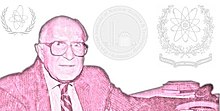Ishrat Hussain Usmani | |
|---|---|
 Dr. I. H. Usmani (1917–92) | |
| Born | 15 April 1917 |
| Died | 17 June 1992 (aged 75) |
| Nationality | India (1917–47) Pakistan (1947–92) |
| Alma mater | Aligarh Muslim University Bombay University London University |
| Known for | Nuclear arms control |
| Awards | |
| Scientific career | |
| Fields | Atomic physics |
| Institutions | Pakistan Atomic Energy Commission (PAEC) International Atomic Energy Agency (IAEA) |
| Thesis | A study of the growth of compound crystals by electron diffraction (1939) |
| Doctoral advisor | Niels Bohr |
| Other academic advisors | George Paget Thomson |
Ishrat Hussain Usmani (Urdu: عشرت حسین عثمانی) (15 April 1917 – 17 June 1992) NI, best known as I. H. Usmani, was a Pakistani atomic physicist, and later a public official who chaired the Pakistan Atomic Energy Commission (PAEC) from 1960 to 1971 as well as overseeing the establishment of the Space Research Commission.
His career was mostly spent in the Government of Pakistan as a public policy official where he pushed for peaceful and commercial usage of the nuclear energy, and later working on arms control with Ministry of Defense to become a party of Partial Test Ban Treaty in 1963 before joining the International Atomic Energy Agency (IAEA) as its Chair of its Board of Governors.[1] Usmani oversaw the nuclear power generation in Pakistan, working towards commissioning the nuclear power grid station in Karachi, and strengthened the role of the atomic energy commission at the United Nations.[2]
- ^ "The New Board of Governors" (PDF). IAEA Bulletin. 5 (1): 32. 1963.
- ^ Cite error: The named reference
PINSTECHwas invoked but never defined (see the help page).